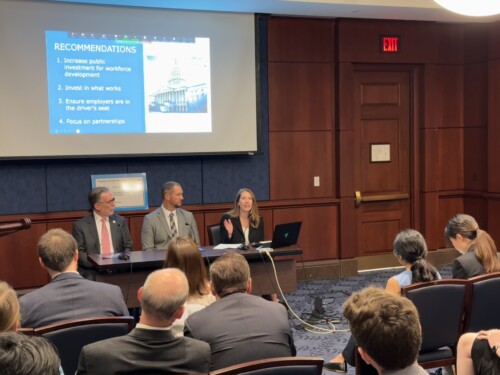Washington, D.C. — Roughly 20% of federal investment in postsecondary education supports workforce development for fields like construction, manufacturing, and more, according to a new report on federal workforce funding levels released today. The report, Building a Stronger Workforce: Federal Spending on Postsecondary Education and Training, produced by the Progressive Policy Institute, the Associated General Contractors of America, and Procore, notes that of the $139.5 billion the federal government spends annually on postsecondary education, only $28.2 billion goes to workforce education and training programs. The other $111.3 billion supports “traditional” degree programs that only 38% of Americans complete — creating a funding gap that is making it difficult for many employers to find qualified talent.
Included in the report are recommendations on how federal and state policymakers can address this discrepancy and better support employers in addressing workforce shortages in high-demand industries. Recommendations include increasing federal investments in workforce development, investing in “what works,” ensuring employers are in the driver’s seat of talent development efforts, and encouraging stronger employer-centered partnerships. The report also highlights promising state programs that provide direct resources for employer-led education and training.
The groups released this report during a bipartisan event earlier today on Capitol Hill that featured remarks from the office of Representative Lloyd Smucker (R-Pa.), the report’s authors, and an employer and training provider, who discussed the challenges posed by the current federal funding levels and urged policymakers to help.
“The wide disparity in federal funding between career and technical education programs and traditional degree-granting higher education programs needs to be rebalanced to ensure the next generation of American workers are prepared to excel in family-sustaining and rewarding careers. I thank AGC and PPI for adding their voices to the much-needed conversation about how the federal government prioritizes education funding. There are many great educational pathways, and it is time for policymakers to recognize this and take action to support students’ success outside of the traditional classroom,” said Rep. Lloyd Smucker.
“We need bipartisan solutions to ensure current and future workers are well-prepared for in-demand employment opportunities,” said Rep. Don Davis (D-N.C.). “I am pleased to see that PPI and AGC are working to address this challenge by examining the discrepancy between federal funding levels of workforce development and traditional academic programs. Our investments in education and workforce development at the federal level must be strategically aligned to unlock the full economic potential for hardworking people in eastern North Carolina and beyond.”

Read and download the report by PPI authors Taylor Maag and Tamar Jacoby here.
The Progressive Policy Institute (PPI) is a catalyst for policy innovation and political reform based in Washington, D.C. Its mission is to create radically pragmatic ideas for moving America beyond ideological and partisan deadlock. Learn more about PPI by visiting progressivepolicy.org. Find an expert at PPI and follow us on Twitter.
The Associated General Contractors of America (AGC) is the leading association for the construction industry. AGC represents more than 27,000 firms, including over 6,500 of America’s leading general contractors, and over 9,000 specialty-contracting firms. More than 10,500 service providers and suppliers are also associated with AGC, all through a nationwide network of chapters.
###
Media Contact: Brian Turmail, Associated General Contractors of America, brian.turmail@agc.org
Tommy Kaelin, Progressive Policy Institute, tkaelin@ppionline.org